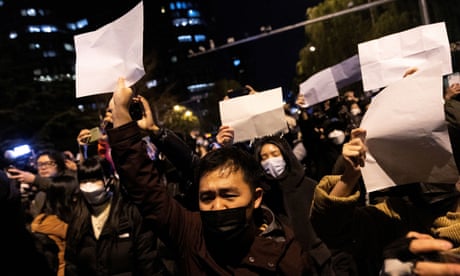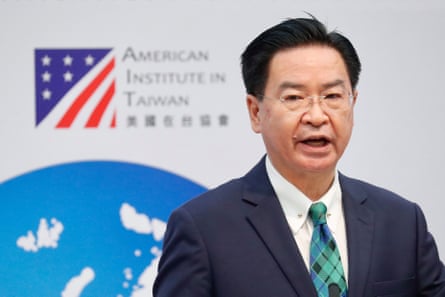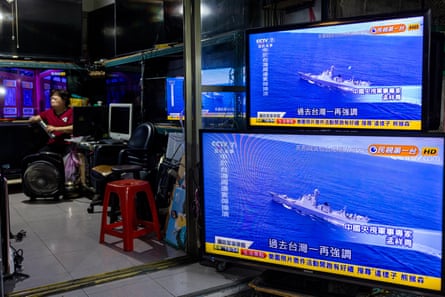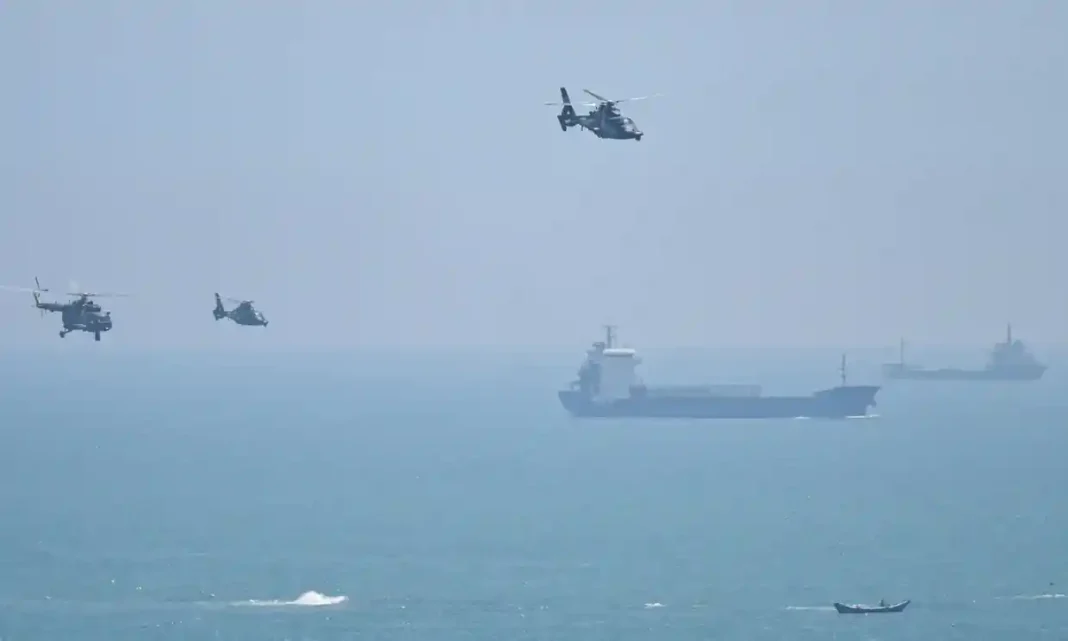Taiwan’s government believes China is preparing to find another “pretext for practising their future attack” on the island, its foreign minister has said, after a record-breaking year of military threats and incursions.
Joseph Wu also suggested cross-strait communications may diminish even further now that Xi Jinping has secured his third term, with last month’s extraordinary political purges of rival Communist party members severing the few unofficial ties remaining.

In an exclusive interview with the Guardian in Taipei, Wu said the Chinese military threat was “getting more serious than ever”, with a five-fold increase in warplane incursions into Taiwan’s defence zone since 2020.
The most serious bout of Chinese military activity was August’s live-fire exercises, staged after US speaker of the house, Nancy Pelosi, visited Taiwan. Chinese officials said the exercises, which included missile launches, were a run-through of blockade tactics they would one day use against Taiwan for real. Analysts noted the scale of the exercises suggested they had likely been long-planned, and the Pelosi visit simply provided the People’s Liberation Army (PLA) with a political pretext.
“And we are quite sure that the Chinese may want to use another pretext of practising their future attacks against Taiwan. So this is a military threat against Taiwan,” said Wu.
The minister said it was not just China’s military efforts that were ramping up, but a “combination of pressures”, including economic coercion, cyber-attacks, cognitive and legal warfare, and diplomatic efforts to have Taiwan isolated internationally.

With the increasing numbers of military incursions into Taiwan’s air defence zone – from 380 Chinese warplanesin 2020 to more than 1,500 already this year – there is a growing risk of accidents which could lead to escalations. Such incidents in the past have been deescalated through cross strait communications, but after Taiwan’s current president Tsai Ing-wen was elected in 2016, Beijing severed official ties.
Wu said Taiwan had previously maintained some lines of communication via Taiwanese businesspeople and academics who had “good connections with the Chinese side”.
But since Xi was reappointed for a third term at the 20th Party Congress there has been a major purge of the party ranks and those doors have been closing, said Wu.
“It is because the Chinese government system has become so authoritarian. It’s not like the old days when regular academia could write recommendations to the central government and are able to get in touch with the key decision-makers and tell us what is the thinking of the top leaders, things like that,” he said.
“In these couple of years, we are seeing that Chinese academia are afraid of saying different things other than Chinese propaganda. And they told us in a very frank way that they are not connected to the central government any more, or even if they are able to connect with government bureaucracies, those bureaucracies don’t seem to have the trust of the top leader any more.
“He is the paramount leader and there’s no one else challenging him right now.”
In response to the growing threat of invasion by China, Taiwan’s government has spent the last few years courting international support among “like minded democracies”.

Wu said the drills conducted after Pelosi’s visit were also aimed at scaring off other governments which might support Taiwan – symbolically now, or militarily later. The furore over Pelosi’s visit prompted some debate about whether it had in fact escalated tensions, despite Taiwan’s insistence she had been gratefully received.
“If China can do that to Speaker Pelosi’s visit to Taiwan, I think that is going to cause concern in other countries [about] whether their support for Taiwan is going to actually damage Taiwan’s national interest rather than providing real support to Taiwan,” he said.
Beijing has repeatedly responded with anger towards any act that appears to support Taiwan, including weaponising bilateral trade, as it did with Lithuania when it opened mutual representative offices with Taipei. It has also pressured some countries to switch their recognition from Taipei entirely, leaving just 14 in the world that do.
However, Beijing’s increasingly aggressive and expansionist behaviour in the region appears so far to have only isolated it further, and emboldened more vocal support of Taiwan.
“I think the international community seems to be coping with it,” Wu said of China’s retaliatory actions.
With pandemic restrictions lifted, Taiwan has seen a marked increase in the number of visiting foreign delegations. Several US groups have visited, and a UK parliamentary delegation met Tsai last week, prompting rebuke from Beijing.
China remains an important partner to many western nations, and governments are walking a tightrope. This week’s cautious tour by an Australian parliamentary delegation occurred at the same time as Canberra is seeking to repair its relationship with Beijing.
Wu acknowledged Australia was facing a “balancing act”.
“But we don’t question the support of the Australian government, the Australian parliament, and Australian people for Taiwan,” he said.
Additional reporting by Chi Hui Lin
theguardian.com

